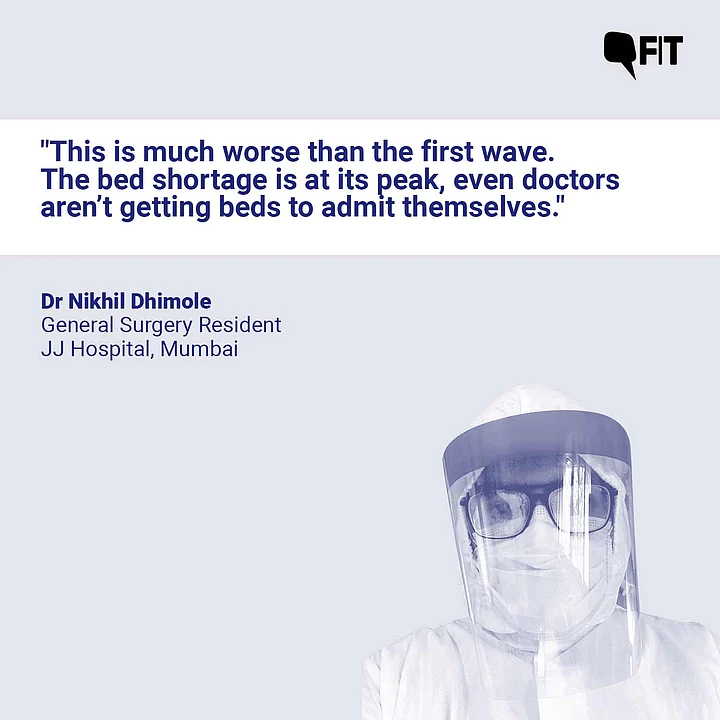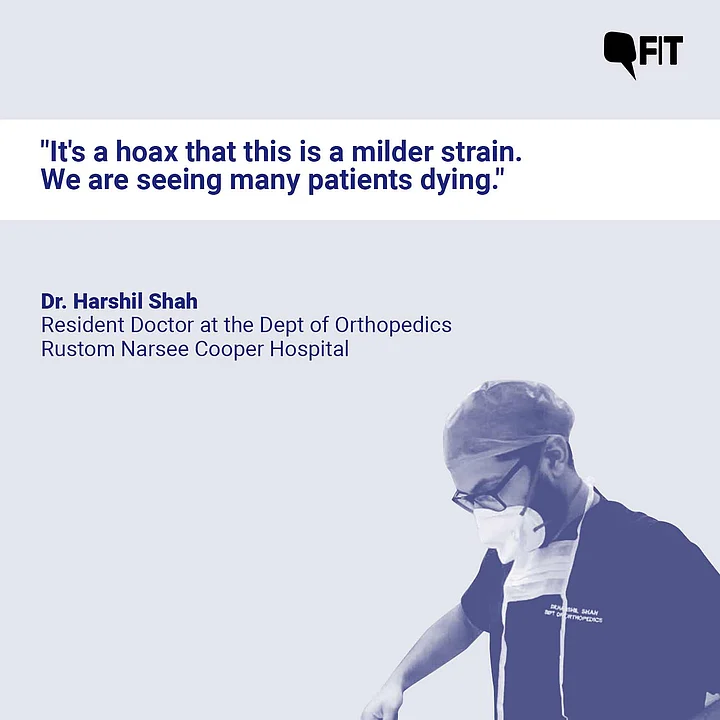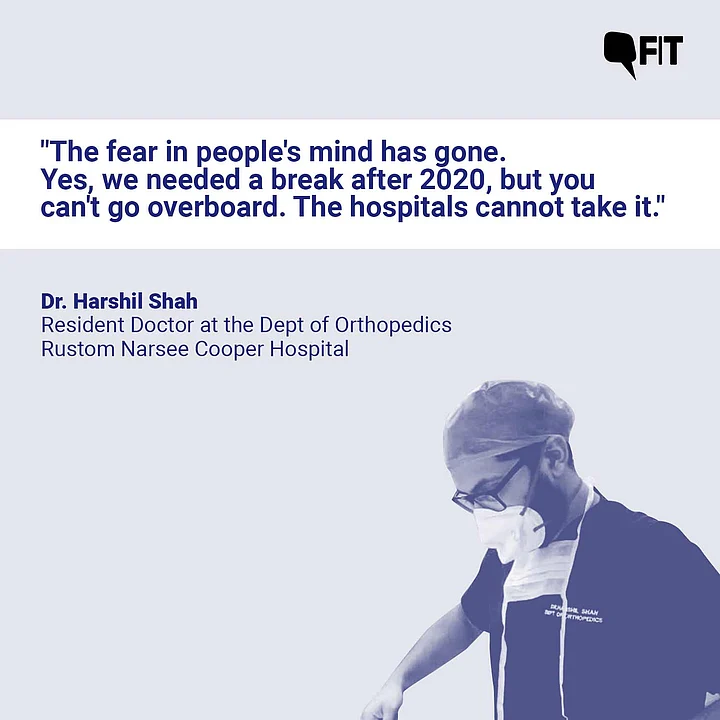Maharashtra is the worst-hit state once again, and Mumbai’s resident doctors are back to square one to pick up the pieces more than a year since the pandemic began.
As with last year, while residents were ready to speak to this reporter, some preferred to be anonymous since they feared backlash from their institution.
Dr Rahul G (name changed on request), Final Year Resident from JJ Hospital explains the ground reality of a COVID ward in Mumbai, “Things are absolutely crazy out here. The second wave has struck harder than the first, the new strain is more infectious and sneaks up from behind.”
Dr Anindita Gangopadhya, a third-year resident in MD Psychiatry at JJ Hospital, “It is so damn exhausting. All our wards are full. There is one doctor for 35-40 patients.”
‘Not Enough Beds, Ventilators or Oxygen Supply’
“Every hospital is struggling. There are literally zero beds - we are having to turn patients away again already.”Dr Harshil Shah, Resident Doctor at the Dept of Orthopedics, Rustom Narsee Cooper Hospital.

“Due to lack of beds, a lot of patients are being denied admissions, the shortage is so crazy that resident doctors and healthcare workers do not have beds for themselves.”Rahul G, Final Year Resident, JJ Hospital
A weary Dr Rahul adds that since March, “more than 60 residents of JJ have turned positive, and many are still under treatment.”
“It’s terrible planning,” says a KEM resident working in COVID wards since 2020. “Right now there's no separate area in the emergency wards for covid suspects and so we are opening new COVID ones and shifting wards again.”
Non-COVID patients were only just starting their treatments, but those may have to be paused to make room for the rising COVID cases, say residents.
“It exactly like how it was back in May-June 2020. The doctor-patient ratio is suffering because so many resident doctors and staff nurses are themselves falling prey to this virus.”Dr. Preeti S
Dr Preeti S (name changed on request) adds, “ We don't have bed availability for covid positive patients, all our wards are full to the brim.” The resident doctors say that getting a bed for an infected doctor is also near impossible.
Dr Harshil says that since they have to turn patients away, home quarantine becomes the solution. “But in a city like Mumbai, isolation at home is not always possible. So the person roams around - often mask less. So from hospitalisation to being without a mask, it’s crazy.”
While periphery clinics are being opened and covid wards being re-opened, Dr Harshil says it’s still not enough, “that's how bad it is already.”
‘We Are Getting Patients Every 5 Minutes’
With rising cases, it is no surprise that hospital beds are getting filled up fast. But residents say that severity is also increasing, as a “lot of breathless patients are coming in.”
A source at a government hospital in Mumbai said that one patient died due to a lack of oxygen available, “forget ventilators, even oxygen ports are getting used up.”
“The numbers being reported are still low I feel. We are seeing patients come in almost every 5 minutes wanting to be admitted.”Dr Harshil Shah, Resident Doctor at the Dept of Orthopedics, Rustom Narsee Cooper Hospital.
He adds that medicines and drugs are also almost over in their wards.
Were all the patients coming in serious? “Not all,” said Dr Harshil, “they ranged from asymptomatic to serious, but we are seeing more patients dying faster this time.”
‘Atypical Presentations’: Profile of COVID Patients
Residents say that this time around patients are coming in with different symptoms. “Many patients have gastro-intestinal symptoms and not just respiratory ones,” says a doctor at Bhabha hospital.
Dr Harshil adds, “The symptoms are different - some patients are coughing blood.”
“They are coming in with atypical presentations - No history of fever or cough, people are directly coming with breathlessness.”Anonymous resident from KEM

Dr Harshil says that it is a hoax that this variant is milder, “it is quite infectious.” In an earlier FIT article, Dr Shubhash Salunke, Maharashtra COVID Technical Advisor, had said that for this wave, “the transmission is taking place in a very rapid fashion.”
“It’s incredibly infective. Almost 40 of my fellow residents are COVID positive.”Rahul G, Final Year Resident, JJ Hospital
The new wave is seen to be infecting people below 45 more this time around, but Dr Harshil said that in his ward, the patients were slightly older. A doctor from KEM said that a large range of ages from 40-70 were being admitted.
But Dr Preeti S said, “We have observed that this new strain is more infectious in comparison to the one last year when it comes to children.”
She adds, “Since I work for the paediatric wards, in this population I have seen a range of age groups...we have a 6 day old covid positive baby and also a 12-year-old, both ends of the spectrum.” She says that so far no patient has required a ventilator but “if the situation worsens at this pace, we will have a shortage very soon. Adult wards are already having ventilator shortage.”
Dr Harshil added that many more patients were testing positive for longer this time around.
Children & COVID-19
This time around, more children are getting infected at a faster pace.
Dr Preeti explains, “Children are having almost the same symptoms of fever, cough and increased respiratory activity. We had a few with vomiting, loose stools and abdominal pain too, but predominantly, it is restricted to fever and respiratory symptoms. And then there are few who have no symptoms at all, but that's worse, cause they are the ones who are the silent carriers.”
It’s difficult to control the transmission with children as getting them to follow COVID protocol (masks, hand-washing) is difficult and impossible for infants. “It's difficult to control the spread if they are infected,” says Dr Preeti.
‘Long Shifts, No Help’
Dr Preeti tells me that in her hospital, in a 30 bedded Covid ICU, there are only 3 resident doctors in one shift, “that means 1 doctor has to manage 10 critical cases, most on ventilators and oxygen support.” Dr Harshil says that in Cooper Hospital, which is a government hospital, there are about 2 doctors per 90 patients.
“We're doing 24 hour duties here as again we don’t have enough doctors on shift,” says a resident doctor who wishes to remain anonymous. “So can't wear PPEs. Yes, there is stock but we can't wear them for 24 hours. We can try and get more beds, more ventilators, but how will we get more man-power?”
On Monday, 5 April, the Maharashtra Association of Resident Doctors (MARD) had written to the Directorate of Medical Education and Research (DMER) with a list of demands like roping in AYUSH doctors to man periphery wards and recruiting more medical officers.
Dr Harshil agrees, “See, in Cooper, we have dentists on COVID wards and it is not fair but we are desperate. AYUSH doctors should come in and help in any way they can.” He adds that more hands - even ones not trained in the specifics - can help with tasks like paperwork etc, which for now falls on the residents.
“There hasn’t been adequate recruitment of doctors for covid ward because the government has simply not provided any lucrative incentive for it,” says Dr Rahul
“People don’t understand, but the high numbers of covid positive patients are burdening the healthcare workers tremendously. If they could all take up responsibility and help in controlling the spread, we would be extremely thankful.”Dr Preeti S
Dr Rahul adds that, “Life as a resident doctor is harder than ever. The increasing heat makes wearing the PPE even more uncomfortable. We literally are drowning in our own sweat. The quality of PPE available is questionable, which not just makes them uncomfortable to wear but also highly risky and hence more doctors are catching the infection than before.”
A doctor from KEM tells me he feels endangered with the lack of planning and resources as residents fight the pandemic from the frontlines - again.
“The entire burden has fallen on the shoulders of resident doctors, and despite being a year deep into the pandemic, it’s only the resident doctors who are working.”Rahul G, Final Year Resident, JJ Hospital
‘People Just Stopped Caring, But We Are at Risk Again’
When the pandemic first hit in 2020, we were in the middle of a lockdown and the public was mostly cautious. But now, resident doctors worry about the lack of discipline as cases surge like never before.
“People have become too casual,” says Dr Harshil, “there is no masking, too much crowding, travel across borders which has opened us up to new strains.”
“It’s exhausting to turn away patients, then go outside the hospital and see crowds without a mask.”Dr Harshil Shah, Resident Doctor at the Dept of Orthopedics, Rustom Narsee Cooper Hospital.

He adds, "The fear in people's mind has gone. Yes, we needed a break after 2020, but you can't go overboard with partying and travelling to Goa. The hospitals cannot take it."
“It’s sad to see that even after imposing night curfew on my way to duty, I can see people roaming in groups, just chit chatting and laughing, WITHOUT WEARING MASKS. We are exhausting ourselves physically and mentally for what? People are not understanding the gravity of the situation.”Dr Anindita Gangopadhya, a third-year resident in MD Psychiatry at JJ Hospital
Dr Harshil concedes that he also thought the worst was over, “I had gotten infected already last year and saw cases go down from November- February, and thought that we were okay.” He says he went out to restaurants and was for the re-opening but then saw the exponential increase in patients in his hospital. “I realised it’s back and it’s serious.”
He urges people to mask up, “and not remove a mask to sneeze!”
Academics at Risk
On the academic front, doctors say they are not getting enough training to deal with the non-covid cases.
“With exams approaching, there’s a lot of resentment building up with the resident doctors, whose basic right to education is grossly challenged. We understand it is the pandemic and we need emergency steps, why are we the only ones shouldering the burden? Is a year not adequate to recruit more doctors?”Rahul G, Final Year Resident, JJ Hospital
A damning letter from the Maharashtra Association of Resident doctors reads, “There are hardly any authorities who seem to understand the problems of the resident doctors. There is hardly anyone who understands the magnitude of the problem it will cause to the society in the future, producing untrained and unskilled human resources.”
(At The Quint, we are answerable only to our audience. Play an active role in shaping our journalism by becoming a member. Because the truth is worth it.)
